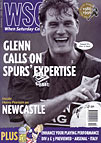 Mark Perryman returned from Moldova wondering if he had been in the same country as the one described in reports of England's World Cup game
Mark Perryman returned from Moldova wondering if he had been in the same country as the one described in reports of England's World Cup game
Foot-long Moldovan cockroaches ready to nibble your naughty bits was what we were promised, courtesy of the Sunday Mirror, Kalashnikov-toting bandits on every late night street corner, according to the People. Such nonsense wasn’t restricted to the tabloids either, the fearless Paul Wilson faxed this local delicacy back to the Observer: “Like some of the female citizens out looking for business on the streets at night, Moldova prefers to be seen in a dim light.”
The press in Moldova were, to a man, accommodated in the Seabaco Hotel, along with the team. This fine hostelry reeked of an elegance and plush luxury few Moldovans have ever seen, let alone experienced. None of the journalists seemed to bother to pop round to the less luxurious residences England’s travelling support stayed in, and neither did they seem remotely interested in finding anything positive about this hard-pressed country that was doing its best to accommodate footballers whose combined insurable worth probably exceeded their annual gross national product several times over.
Yes, the electricity was a touch dodgy, and some of the hotels were lacking in what one might expect would come out of the hot water tap, but ‘oxtail soup coming out of bath taps’ (Paul Wilson in the incredibly enlightened Observer again)? Not in any hotel the fans were staying in, and certainly not in your luxurious pad, mate.
Football is hardly the Moldovans’ national sport. For that you needed to tour the side streets on Saturday morning where crowds gathered for organized bouts of Graeco-Roman wrestling. The popularity of football is in some large measure sustained thanks to UEFA financial support and Puma sponsorship, acts intended to ensure football’s highly-valued global appeal and trans-media marketable value – we can’t have people thinking Saturday’s are for wrestling, can we?
It’s a pity then that UEFA’s involvement didn’t stretch to thinking of Moldovan fans of tomorrow – a ticket for the game cost 50 Lei, which, when the average weekly wage is just 80 Lei, makes Wembley prices positively charitable. The FA’s gesture of handing over 100 footballs to Moldovan schools was nice enough, but with a little more thought and imagination couldn’t some events have been thought up where English and Moldovan fans could have mixed?
Romantic, yes, but when we talk enviously of the Scots and Irish supporters as ‘people’s ambassadors’ this is precisely the kind of initiative needed to help bring about a positive change in the nature of England’s away support.
Local prices made this a really cheap place to stay, and unlike Manchester during Euro ’96 there were precious few examples of bars and restaurants upping the prices to rip off unsuspecting fans. The policing was polite and decidedly low-key, we weren’t treated as an invading army and hardly anybody behaved as if they were a member of one. Moldova offered cheap wine and sunshine and a generosity of spirit. It’s a pity that our all-expenses paid friends from the press weren’t able to respond in kind.
From WSC 116 October 1996. What was happening this month